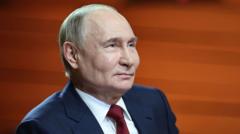The murder of Andriy Portnov, a former Ukrainian official embroiled in controversy, in a Madrid suburb has revealed deep-seated sentiments about his past as well as the murky motives surrounding his death, garnering little sympathy from Ukraine.
**Shockwaves from a Controversial Murder: The Life and Death of Andriy Portnov in Madrid**

**Shockwaves from a Controversial Murder: The Life and Death of Andriy Portnov in Madrid**
Andriy Portnov's assassination in Madrid has left many questioning the consequences of his controversial political history and connections.
Despite initially shocking many, the assassination of Andriy Portnov—a once influential figure under Ukraine's pro-Russian regime—has not incited widespread mourning in Ukraine. Known for his checkered past, Portnov was gunned down in a parking lot after dropping off his children at the American School in Madrid, with the manner of his death drawing both concern and speculative intrigue.
Alive with allegations, Portnov, aged 51, remained a figure of disdain back in Ukraine, infamous for his threats against journalists and his close ties with previous pro-Russian President Viktor Yanukovych. "His end was poetic, a reflection of his life," remarked journalist Oleksandr Holubov, emphasizing the apparent irony of his violent demise. While most Ukrainian news outlets feature criticism of Portnov, some opponents in Ukrainian politics urge a more humane perspective, stating that even controversial figures deserve respectful consideration in death.
Portnov began his political journey as a lawyer and later gained prominence as the deputy head of Yanukovych's Presidential Office, where he engineered a legal framework that critics claim enabled a culture of corruption and facilitated Russia's influence in Ukraine. Legal expert Mykhailo Zhernakov remarked that Portnov was "the kingpin" of this altered judicial structure, laying the groundwork for the government to shield illicit activities.
During the decade leading up to Ukraine's tumultuous 2014 revolution, Portnov employed a strategy of intimidation against journalists, using his control over the legal system to stifle dissent. This led to his eventual sanctioning by the United States for manipulating legal processes to bolster his interests. Following Yanukovych's ousting, Portnov fled to Moscow, where he continued to exert political influence even from afar.
Years later, he found himself in Spain, where he appeared to enjoy a comfortable life while still facing significant animosity from his critics in Ukraine. Speculations surrounding the motivations behind his murder are rife, with experts positing possibilities ranging from vendettas by criminal organizations to retributions from Russian operatives. Despite various potential culprits, Ukrainian authorities seem reluctant to implicate themselves in the case.
Spanish media is divided on whether this incident springs from political motivations or economic disputes, reflecting the complex nature of Portnov's relations in life. "He had many adversaries," noted investigative reporter Maksym Savchuk, speaking to the wide array of enemies he cultivated throughout his career.
In the wake of Portnov's murder, calls for reflection on broader judicial reforms in Ukraine persist, echoing Zhernakov's sentiments that his death, while significant, does not eradicate the influence he had in setting up a corrupt system, as many of his former allies remain entrenched within the legal framework.
Thus, the fallout from Portnov's death extends beyond personal tragedy to a larger discourse on Ukraine's ongoing battle against corruption and the enduring legacy of power he once wielded.
Alive with allegations, Portnov, aged 51, remained a figure of disdain back in Ukraine, infamous for his threats against journalists and his close ties with previous pro-Russian President Viktor Yanukovych. "His end was poetic, a reflection of his life," remarked journalist Oleksandr Holubov, emphasizing the apparent irony of his violent demise. While most Ukrainian news outlets feature criticism of Portnov, some opponents in Ukrainian politics urge a more humane perspective, stating that even controversial figures deserve respectful consideration in death.
Portnov began his political journey as a lawyer and later gained prominence as the deputy head of Yanukovych's Presidential Office, where he engineered a legal framework that critics claim enabled a culture of corruption and facilitated Russia's influence in Ukraine. Legal expert Mykhailo Zhernakov remarked that Portnov was "the kingpin" of this altered judicial structure, laying the groundwork for the government to shield illicit activities.
During the decade leading up to Ukraine's tumultuous 2014 revolution, Portnov employed a strategy of intimidation against journalists, using his control over the legal system to stifle dissent. This led to his eventual sanctioning by the United States for manipulating legal processes to bolster his interests. Following Yanukovych's ousting, Portnov fled to Moscow, where he continued to exert political influence even from afar.
Years later, he found himself in Spain, where he appeared to enjoy a comfortable life while still facing significant animosity from his critics in Ukraine. Speculations surrounding the motivations behind his murder are rife, with experts positing possibilities ranging from vendettas by criminal organizations to retributions from Russian operatives. Despite various potential culprits, Ukrainian authorities seem reluctant to implicate themselves in the case.
Spanish media is divided on whether this incident springs from political motivations or economic disputes, reflecting the complex nature of Portnov's relations in life. "He had many adversaries," noted investigative reporter Maksym Savchuk, speaking to the wide array of enemies he cultivated throughout his career.
In the wake of Portnov's murder, calls for reflection on broader judicial reforms in Ukraine persist, echoing Zhernakov's sentiments that his death, while significant, does not eradicate the influence he had in setting up a corrupt system, as many of his former allies remain entrenched within the legal framework.
Thus, the fallout from Portnov's death extends beyond personal tragedy to a larger discourse on Ukraine's ongoing battle against corruption and the enduring legacy of power he once wielded.



















